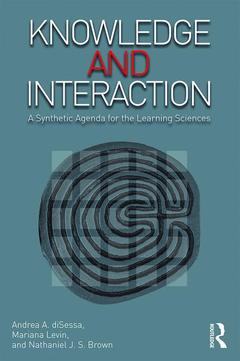Knowledge and Interaction A Synthetic Agenda for the Learning Sciences

Decades of research in the cognitive and learning sciences have led to a growing recognition of the incredibly multi-faceted nature of human knowing and learning. Up to now, this multifaceted nature has been visible mostly in distinct and often competing communities of researchers. From a purely scientific perspective, "siloed" science?where different traditions refuse to speak with one another, or merely ignore one another?is unacceptable. This ambitious volume attempts to kick-start a serious, new line of work that merges, or properly articulates, different traditions with their divergent historical, theoretical, and methodological commitments that, nonetheless, both focus on the highly detailed analysis of processes of knowing and learning as they unfold in interactional contexts in real time.
Knowledge and Interaction puts two traditions in dialogue with one another: Knowledge Analysis (KA), which draws on intellectual roots in developmental psychology and cognitive modeling and focuses on the nature and form of individual knowledge systems, and Interaction Analysis (IA), which has been prominent in approaches that seek to understand and explain learning as a sequence of real-time moves by individuals as they interact with interlocutors, learning environments, and the world around them. The volume?s four-part organization opens up space for both substantive contributions on areas of conceptual and empirical work as well as opportunities for reflection, integration, and coordination.
Preface
Acknowledgements
List of Contributors
Introduction
Part 1: Foundations
Chapter 1: Competence Reconceived: The Shared Enterprise of Knowledge Analysis and Interaction Analysis
Nathaniel J. S. Brown, Joshua A. Danish, Mariana Levin, Andrea A. diSessa
Chapter 2: Knowledge Analysis: An Introduction
Andrea A. diSessa, Bruce L. Sherin, Mariana Levin
Chapter 3
Interaction Analysis Approaches to Knowledge in Use
Rogers Hall, Reed Stevens
Part 2: Synthetic Analyses
Chapter 4: Ecologies of Knowing: Lessons From the Highly Tailored Practice of Hobbies
Flávio S. Azevedo, Victor R. Lee
Chapter 5: A Microlatitudinal/Microlongitudinal Analysis of Speech, Gesture, and Representation Use in a Student’s Repeated Scientific Explanations of Phase Change
David DeLiema, Victor R. Lee, Joshua A. Danish, Noel Enyedy, Nathaniel J. S. Brown
Chapter 6: Working Towards an Integrated Analysis of Knowledge in Interaction
Joshua A. Danish, Noel Enyedy, Orit Parnafes
Commentary: When Will Science Surpass Our Intuitive Capacities as Expert Practitioners?
Andrea A. diSessa
Chapter 7: "Seeing" as Complex, Coordinated Performance: A Coordination Class Theory Lens on Disciplined Perception
Mariana Levin, Andrea A. diSessa
Chapter 8: Working Out: Mathematics Learning as Motor Problem Solving in Instrumented Fields of Promoted Action
Dor Abrahamson, Dragan Trninic
Chapter 9: Gestures, Speech, and Manipulation of Objects as a Window and Interface to Individual Cognition
Shulamit Kapon
Commentary: "IA Lite": Capturing Some of the Explanatory Power of Interaction Analysis Without Committing to Its Ontology
Andrew Elby
Chapter 10: Bridging Knowledge Analysis and Interaction Analysis Through Understanding the Dynamics of Knowledge in Use
Ayush Gupta, Andrew Elby, Vashti Sawtelle
Chapter 11: Ensemble Learning and Knowing: Developing a Walking Scale Geometry Dilation Strategy
Jasmine Y. Ma
Commentary: From the Individual to the Ensemble and Back Again
Luke D. Conlin, David Hammer
Chapter 12: Parents as Skilled Knowledge Practitioners
Jessica F. Umphress
Chapter 13: Knowledge and Interaction in Clinical Interviewing: Revoicing
Andrea A. diSessa, James G. Greeno, Sarah Michaels, Catherine O’Connor
Chapter 14: The Intersection of Knowledge and Interaction: Challenges of Clinical Interviewing
Rosemary S. Russ, Bruce L. Sherin, Victor R. Lee
Chapter 15: Feedback-Relevant Places: Interpreting Shifts in Explanatory Narratives
Nathaniel J. S. Brown
Part 3: Theoretical, Methodological, and Meta-Scientific Issues
Chapter 16: Computational Analysis and the Importance of Interactional Detail
Bruce L. Sherin
Commentary: The Need for the Participant’s Perspective in a KAIA Joint Enterprise
Noel Enyedy, Joshua A. Danish
Chapter 17: Navigating Turbulent Waters: Objectivity, Interpretation, and Experience in the Analysis of Interaction
Ricardo Nemirovsky, Molly L. Kelton
Chapter 18: Three Meta-Scientific Micro-Essays
Andrea A. diSessa
Chapter 19: Towards a Generous* Discussion of Interplay Between Natural Descriptive and Hidden Machinery Approaches in Knowledge and Interaction Analysis
Rogers Hall, Ricardo Nemirovsky, Jasmine Y. Ma, Molly L. Kelton
Commentary: "Openness" as a Shared Research Aesthetic Between Knowledge Analysis and Interaction Analysis
Mariana Levin
Commentary: How Science is Done
Andrea A. diSessa
Part 4: Reflections and Prospects
Chapter 20: Another Candidate for Relating Knowledge Analysis and Interaction Analysis: Mitchell’s Integrative Pluralism
James G. Greeno
Chapter 21: That Old Problem of Intersubjectivity
Timothy Koschmann
Chapter 22: Reflections: The KAIA Project and Prospects
Andrea A. diSessa, Mariana Levin, Nathaniel J. S. Brown
Index
Andrea A. diSessa is Corey Professor of Education Emeritus and Professor of the Graduate School at the University of California, Berkeley, USA. He is a member of the National Academy of Education and a Fellow of the American Educational Research Association.
Mariana Levin is Assistant Professor of Mathematics Education in the Department of Mathematics at Western Michigan University.
Nathaniel J. S. Brown is Associate Research Professor of Educational Research, Measurement, and Evaluation at the Lynch School of Education, Boston College, USA.
Date de parution : 12-2015
15.2x22.9 cm
Date de parution : 12-2015
15.2x22.9 cm
Thème de Knowledge and Interaction :
Mots-clés :
Clinical Interviews; Knowledge and Interaction; Vice Versa; Andrea diSessa; Kon; Mariana Levin; Coordination Class; Nathaniel J; S; Brown; DP; social theory; Knowledge Elements; cognitive theory; Interaction Analysis; cognitive science; Interaction Analysis Perspective; educational psychology; Ensemble Learning; embodied cognition; Dynamic Balance; embodied knowledge; Participation Framework; experiential knowledge; Hidden Machineries; learning environments; Knowledge Analyst; learning science; Dilation Strategy; mediation; Semiotic Field; sociality; LDA; interaction; Deep Synergy; Knowledge Analysis; Epistemic Aim; Model Rocketeers; Interactional Detail; Flagging Tape; Conceptual Ecologies; Explanatory Primitives; Causal Thread; Interviewer Turns


